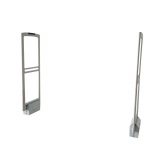Are you curious about how RFID card scanners can revolutionize your hotel operations? Whether you are a hotel owner looking to streamline check-ins, enhance guest satisfaction, or improve operational efficiency, RFID technology offers transformative solutions. By leveraging electromagnetic fields for contactless authentication, RFID card scanners simplify room access, meet modern expectations for convenience, and reduce the hassle of traditional key cards. Beyond guest interactions, these systems boost operational workflows, provide secure access control, and offer valuable insights into guest behavior for personalized service and informed decision-making. Explore how RFID can elevate your hospitality business and redefine the guest experience.
- Understanding RFID Technology in Hospitality
- Try Asecuri for the best RFID card scanners today!
- Enhancing Security with RFID Card Scanners
- Streamlining Operations in Hospitality Management with RFID
- Improving Guest Experience through Contactless Solutions and Loyalty Programs
- Types of Key Cards in the Hospitality Sector: A Comprehensive Overview
- Unlocking New Opportunities with RFID Technology
- Final thoughts on embracing the future of hospitality technology with RFID card scanners
Understanding RFID Technology in Hospitality
Radio Frequency Identification (RFID) uses electromagnetic fields to automatically identify and track tags attached to objects, such as key cards. This technology allows for contactless authentication, making it a significant improvement over traditional magnetic stripe cards.
How RFID Technology Works
RFID systems consist of three key components: the tag, which contains a microchip and antenna for storing and transmitting information; the reader, which emits radio waves to communicate with the tag; and a backend database that manages the data. When a guest approaches an RFID reader with their key card, radio waves activate the tag, which then transmits its information for quick identity verification. This process enhances operational efficiency and improves the guest experience. RFID technology offers significant benefits for hospitality, including improved security by reducing cloning risks, durability due to non-contact operation, and faster processing speeds that streamline service delivery.
Types of RFID Cards in Hospitality
Different types of RFID cards are commonly used in hotels:
- Low-Frequency (LF) Cards:
- Operate at 125 kHz.
- Ideal for basic access control.
- High-Frequency (HF) Cards:
- Operate at 13.56 MHz.
- Support more complex applications like payment processing.
- Ultra High-Frequency (UHF) Cards:
- Operate between 300 MHz and 3 GHz.
- Used for long-range applications like parking management.
Each type caters to specific operational needs, offering flexibility and scalability in hotel management systems.

Enhancing Security with RFID Card Scanners
RFID technology significantly enhances security for hotel guests and properties by reducing the risk of unauthorized access. Unlike traditional magnetic stripe cards that can be easily cloned or tampered with, RFID cards offer a higher level of protection due to their encrypted data transmission and unique identification codes. These features ensure that only authorized personnel and guests can access restricted areas, providing peace of mind for both hotel management and visitors.
Key security features of RFID card scanners include:
- Encrypted Data Transmission: Ensures that the information exchanged between the card and the scanner is secure and cannot be intercepted or duplicated.
- Unique Identification Codes: Each RFID card contains a unique code that is difficult to replicate, minimizing the chances of unauthorized access.
Remote deactivation features play a crucial role in safeguarding against lost or stolen cards. If a guest misplaces their RFID key card, hotel staff can quickly deactivate it remotely, preventing any potential misuse. This capability not only enhances security but also streamlines the process of issuing new cards without compromising safety.
Incorporating these advanced security measures makes RFID card scanners an invaluable tool in modern hospitality, ensuring that guests feel safe during their stay while maintaining operational efficiency.
Streamlining Operations in Hospitality Management with RFID
RFID card scanners significantly enhance operational efficiency in the hospitality industry. By automating check-in processes, these devices reduce wait times at the front desk, allowing guests to access their rooms swiftly and effortlessly. This shift not only improves guest satisfaction but also optimizes staff resource allocation.
Data collection automation is another key advantage of RFID technology. Each interaction with an RFID card generates valuable data that can be used for analytics purposes. Hotels can track guest movements, preferences, and service usage patterns, enabling them to make data-driven decisions to improve their offerings.
Seamless integration with existing property management systems (PMS) is crucial for maximizing the benefits of RFID technology. Modern RFID solutions are designed to integrate smoothly with PMS platforms, ensuring a unified system that enhances overall operational efficiency.
Benefits of RFID Technology in Hospitality Management
- Efficient Check-ins: Guests can bypass traditional check-in procedures, reducing congestion at the reception.
- Accurate Data Collection: Automated tracking of guest interactions provides actionable insights.
- PMS Integration: Ensures all systems work together harmoniously, streamlining various operational aspects.
By leveraging RFID technology, hotels can create a more efficient and responsive operational environment, ultimately enhancing both guest satisfaction and management capabilities.
Improving Guest Experience through Contactless Solutions and Loyalty Programs
Enhancing guest convenience is a crucial aspect of the modern hospitality industry. RFID key cards simplify room access for guests, offering a hassle-free experience during their stay. The contactless nature of RFID cards allows guests to enter their rooms with just a wave of the card near the scanner, eliminating the frustration associated with traditional magnetic stripe cards that often demagnetize or malfunction.
Hotels can utilize RFID technology for innovative loyalty programs that provide personalized services to guests. For example:
- Personalized Room Settings: Upon scanning their RFID card, returning guests can enjoy pre-set room preferences such as preferred temperature, lighting settings, and even favorite TV channels.
- Exclusive Access: Loyalty program members might receive RFID cards that grant them access to exclusive areas like VIP lounges, private pools, or special event spaces.
- Seamless Service Integration: Guests can use their RFID cards for in-house purchases at restaurants, spas, and other amenities, which are then linked directly to their loyalty accounts for rewards and discounts.
These features not only enhance guest convenience but also foster a sense of personalized service and appreciation. The ability to offer such tailored experiences helps hotels build stronger relationships with their guests, encouraging repeat visits and positive word-of-mouth referrals. Seamless access control combined with personalized services via loyalty rewards creates a compelling value proposition for both guests and hoteliers.
Types of Key Cards in the Hospitality Sector: A Comprehensive Overview
Different key card technologies offer unique benefits and drawbacks, which can significantly impact hotel operations. Understanding these differences helps in making informed decisions.
1. Magnetic Stripe Cards
Magnetic stripe cards have been a staple in the hospitality sector for years. They store data on a magnetic strip, which is swiped through a reader to gain access.
Pros:
- Cost-effective: Generally cheaper to produce and replace.
- Familiarity: Widely used and understood by both staff and guests.
Cons:
- Wear and Tear: Susceptible to physical damage and demagnetization.
- Security Risks: Easier to clone or tamper with compared to more advanced technologies.
2. NFC (Near Field Communication) Cards
NFC cards use radio waves to communicate with readers, offering a contactless experience for users.
Pros:
- Durability: Less prone to physical damage since they do not require swiping.
- Enhanced Security: Harder to clone and can be remotely deactivated if lost or stolen.
- Convenience: Faster access as users simply need to tap the card near the reader.
Cons:
- Cost: More expensive than magnetic stripe cards.
- Compatibility: This may require upgrades to existing systems to support NFC technology.
3. Universal Readers
Universal readers can read multiple types of cards, including both magnetic stripe and NFC cards, providing flexibility for hotels.
Pros:
- Flexibility: Can read multiple types of cards, including both magnetic stripe and NFC cards, ensuring seamless operations across different technologies.
Cons:
- Potential Complexity: This may involve integration challenges with existing systems, requiring additional training for staff on varied functionalities.
Factors influencing the choice of card technology include property size, budget constraints, and specific operational requirements. Large properties might benefit more from the enhanced security and analytics capabilities of NFC cards, while smaller establishments might prefer the cost-effectiveness of magnetic stripe cards. Universal readers offer a balanced approach by supporting multiple technologies, ensuring seamless operations regardless of the card type used.
Unlocking New Opportunities with RFID Technology
Visitor behavior tracking through RFID systems allows hotels to collect comprehensive data on guest interactions and preferences. This data can reveal patterns such as peak check-in times, popular amenities, and frequently visited areas within the property.
With data-driven decision-making for enhanced guest experiences, hotels can:
- Personalize services: Tailor room settings, dining options, and activity recommendations based on individual guest preferences.
- Optimize resource allocation: Adjust staffing levels and inventory management in real-time to meet demand efficiently.
- Enhance marketing strategies: Develop targeted promotions and loyalty programs that resonate with specific guest segments.
RFID technology empowers hoteliers to transform raw data into actionable insights, fostering a more responsive and guest-centric environment.
Final thoughts on embracing the future of hospitality technology with RFID card scanners
RFID solutions significantly impact the hospitality industry by creating a more secure, efficient, and guest-focused environment. They enhance security by reducing unauthorized access risks through features like remote deactivation, which boosts guest confidence. Operational efficiency is improved with contactless entry systems that minimize wait times and increase satisfaction. Additionally, accurate data collection helps management optimize resources and services.
The guest experience is also enhanced with simplified room access and personalized services based on preferences, encouraging loyalty and repeat visits. As hospitality technology evolves, hoteliers should adopt RFID systems to stay competitive and meet changing guest expectations, enhancing their operational capabilities and establishing themselves as leaders in exceptional hospitality experiences.
Invest in RFID card scanners to revolutionize your hospitality operations and deliver exceptional guest experiences.
By incorporating RFID technology, hotels can streamline operations, enhance security measures, and elevate the overall guest experience. Embracing this transformative technology will not only boost efficiency but also position hotels as forward-thinking and customer-centric establishments in an increasingly competitive landscape.


































